
A bicycle, also called a pedal cycle, bike, push-bike or cycle, is a human-powered or motor-assisted, pedal-driven, single-track vehicle, with two wheels attached to a frame, one behind the other. A bicycle rider is called a cyclist, or bicyclist.

A tricycle, sometimes abbreviated to trike, is a human-powered three-wheeled vehicle.
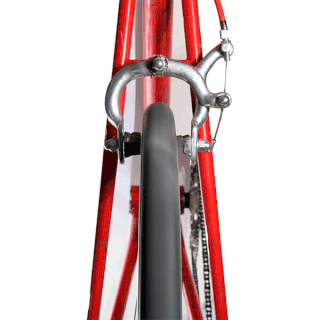
A bicycle brake reduces the speed of a bicycle or prevents the wheels from moving. The two main types are: rim brakes and disc brakes. Drum brakes are less common on bicycles.

Mountain biking is a sport of riding bicycles off-road, often over rough terrain, usually using specially designed mountain bikes. Mountain bikes share similarities with other bikes but incorporate features designed to enhance durability and performance in rough terrain, such as air or coil-sprung shocks used as suspension, larger and wider wheels and tires, stronger frame materials, and mechanically or hydraulically actuated disc brakes. Mountain biking can generally be broken down into distinct categories: cross country, trail, all mountain, enduro, downhill and freeride.

A touring bicycle is a bicycle designed or modified to handle bicycle touring. To make the bikes sufficiently robust, comfortable and capable of carrying heavy loads, special features may include a long wheelbase, frame materials that favor flexibility over rigidity, heavy duty wheels, and multiple mounting points.

Mountainboarding (MTB), also known as dirtboarding, off-road boarding, and All-Terrain Boarding (ATB), is a well-established, but little-known action sport derived from snowboarding. The sport was initially pioneered by James Stanley during a visit to the Matterhorn in the 1990s, where snow was not available. A mountainboard is made up of components including a deck, bindings, four wheels with pneumatic tires, and two steering mechanisms known as trucks. Mountainboarders, also known as riders, ride specifically designed boardercross tracks, slopestyle parks, grass hills, woodlands, gravel tracks, streets, skateparks, ski resorts, BMX courses, and mountain bike trails. It is this ability to ride such a variety of terrain that makes mountainboarding unique from other board sports.

A utility bicycle, city bicycle, urban bicycle, European city bike (ECB), Dutch bike, classic bike or simply city-bike is a bicycle designed for frequent very short, relatively slow rides through very flat urban areas. It is a form of utility bicycle commonly seen around the world, built to facilitate everyday short-distance riding in normal clothes in cold-to-mild weather conditions. It is therefore a bicycle designed for very short-range practical transportation, as opposed to those primarily for recreation and competition, such as touring bicycles, road bicycles, and mountain bicycles. Utility bicycles are the most common form globally, and comprise the vast majority found in the developing world. City bikes may be individually owned or operated as part of a public bike sharing scheme.

Cyclo-cross is a form of bicycle racing. Races typically take place in the autumn and winter, and consist of many laps of a short course featuring pavement, wooded trails, grass, steep hills and obstacles requiring the rider to quickly dismount, carry the bike while navigating the obstruction and remount. Races for senior categories are generally between 40 minutes and an hour long, with the distance varying depending on the ground conditions. The sport is strongest in the traditional road cycling countries such as Belgium, France and the Netherlands.
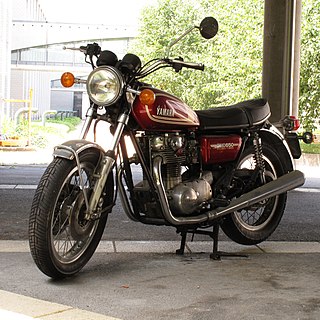
The Yamaha XS650 is a mid-size motorcycle that was made by the Yamaha Motor Company. The standard model was introduced in October 1969, and produced until 1979. The "Special" cruiser model was introduced in 1978 and produced until 1985. The XS650 began with the 1955 Hosk SOHC 500 twin. After about 10 years of producing 500 twin, Hosk engineers designed a 650 cc twin. Later Showa Corporation acquired the Hosk company, and in 1960 Yamaha acquired Showa, with Hosk's early design of 650 cc twin.

A roadster bicycle is a type of utility bicycle once common worldwide, and still common in Asia, Africa, Latin America, and some parts of Europe. During the past few decades, traditionally styled roadster bicycles have regained popularity in the Western world, particularly as a lifestyle or fashion statement in an urban environment.

The Yamaha XS Eleven motorcycle, also called XS 1100 and XS 1.1, is a Japanese standard produced from late 1977 (MY1978) to 1983, powered by an air-cooled 1,101 cc (67.2 cu in) 4-stroke, DOHC inline four-cylinder engine mounted transversely in a duplex cradle frame with swingarm rear suspension, shaft drive, and telescopic forks.

Bicycle suspension is the system, or systems, used to suspend the rider and bicycle in order to insulate them from the roughness of the terrain. Bicycle suspension is used primarily on mountain bikes, but is also common on hybrid bicycles.

Cross-country (XC) cycling is a discipline of mountain biking. Cross-country cycling became an Olympic sport in 1996 and is the only form of mountain biking practiced at the Olympics.
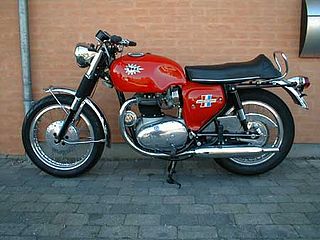
The BSA Spitfire is a high-performance BSA motorcycle made from 1966 to 1968 with model designations of MkII, MkIII and MkIV. Announced at the Brighton motorcycle show held during September 1965, it was based on the earlier BSA Lightning with a power-upgrade achieved by higher compression-ratio 10.5:1 pistons and two large-bore Amal GP carburettors with velocity stacks it was one of the first BSAs to have 12-volt electrics. At introduction in 1966, it was the fastest standard BSA ever produced and the fastest standard motorcycle tested by Motor Cycle with a best run at 123 mph and average of 119.2 mph The Spitfire was used for travelling Marshalls' course duties at the 1967 Isle of Man TT races.

Outdoor recreation or outdoor activity refers to recreation done outside, most commonly in natural settings. The activities that encompass outdoor recreation vary depending on the physical environment they are being carried out in. These activities can include fishing, hunting, backpacking, walking and horseback riding — and can be completed individually or collectively. Outdoor recreation is a broad concept that encompasses a varying range of activities and landscapes.
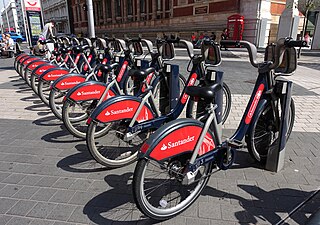
Santander Cycles is a public bicycle hire scheme in London in the United Kingdom. The scheme's bicycles have been popularly known as Boris Bikes, after Boris Johnson who was Mayor of London when the scheme began operating.
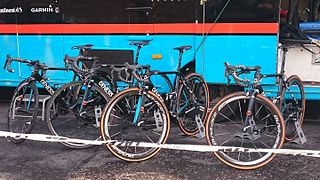
Founded in 2006, Genesis is a UK bike brand manufacturing adventure & gravel, road, urban/utility, e-bike and touring models.
Madison Genesis was a British-based professional road cycling team, registered at UCI Continental level and competing in domestic and European competitions between 2013 and 2019.

Road Rash is a 1991 racing and vehicular combat video game originally developed and published by Electronic Arts (EA) for the Sega Genesis. It was subsequently ported to a variety of contemporary systems by differing companies. The game is centered around a series of motorcycle races throughout California that the player must win to advance to higher-difficulty races, while engaging in unarmed and armed combat to hinder the other racers.

















